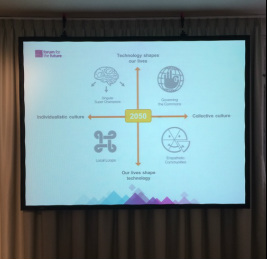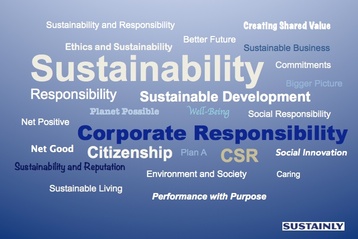
The exam question of the three year project is how we catalyse citizen driven innovation to create a more sustainable Europe. To start the process off, Forum ran this immersive futures workshop looking at four distinct plausible scenarios for 2050 (but at the edge of our imagination, as a good scenario should be!) which had all found ways of of achieving the goal of using 75% less resource than we do today. The scenarios sat in four quadrants, defined by the extent of their collective vs. individualistic culture on one hand and the extent to which we shape technology or vice versa on the other. They were all thought provoking, disturbing in parts but also exciting and inspirational in others.
It is early days in this three year project, but here are some of the key things I took out of the day:
- Technology enables anyone to influence our sustainable future - from eBay to Landshare, there is evidence that a good idea coupled with determination and the power of technology allows citizens to drive sustainable change.
- Empathy is an increasingly important concept in our quest to change behaviour - we have talked about Roman Krznaric's thinking on empathy in this blog before (here and here) and it was amazing how many times the concept came up during the day, including as the title of one of the scenarios ('Empathetic Communities')
- Sharing economy - not a new phenomenon any more, but our discussions confirmed just how big and important a trend it is for sustainability
- Big data and the internet of things will be key to enabling large scale citizen driven change - in my opinion, we can't let privacy protection lobbies (who undoubtedly also do good work) stop us from collecting data at all. Ultimately, it will enable innovation for a more sustainable future.
- Initiatives around food (waste) came up during discussions time and again- it is clear that this is an area where citizen led innovation is already thriving.
- Finally, and potentially driven by who was attending, there was a distinct lack of discussion of energy issues, which somewhat surprised me. Great community energy initiatives notwithstanding, perhaps this is a reflection of where we feel citizens can have the most influence - government and large energy companies will still have to do their bit!
All in all it was a great day and I look forward to continuing to support the project. I will continue to update on the outputs and findings of the project through this blog so do check back regularly.
by Jesper Ekelund
| | |



 RSS Feed
RSS Feed